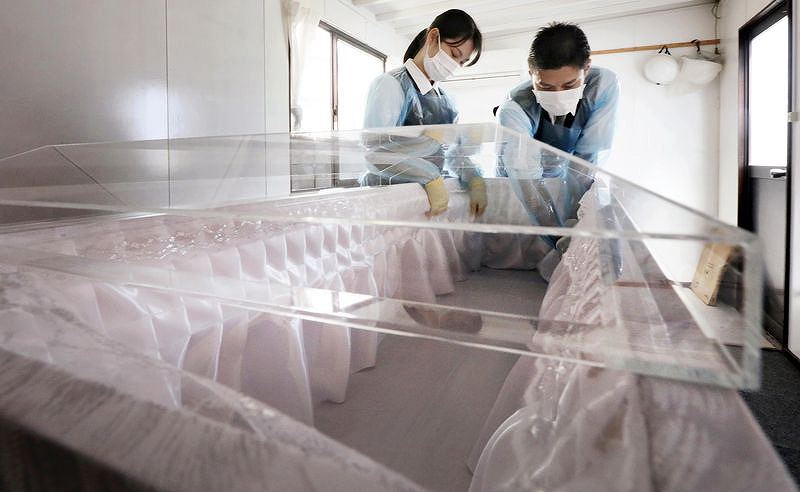
A new funeral business in Kitakyushu has a coffin with an acrylic lid so mourners can see the body of a person who died from COVID-19.
December 9, 2021
Constrained by infection prevention measures and families’ fear of discrimination, undertakers are striving to help people say goodbye to loved ones who have died from COVID-19.
According to guidelines established by the Health, Labor and Welfare Ministry, people who die from COVID-19 are in principle to be put into a body bag at the hospital, transported to a crematory and cremated without the bag being opened, to prevent the spread of the virus. A survey has found that this, combined with prejudice and discrimination, has led to 80% of bereaved families having their relatives cremated without seeing their face for a final goodbye.
More than 18,000 people have died from COVID-19 in Japan. In the words of one expert: “Funeral services are important to help people accept the death of a family member. An environment must be created that will fulfil the needs of bereaved families.”
At Tengokusya Co.’s Ito Hall in Nishi Ward, Fukuoka, a funeral service was held in early August for a man in his 80s who died from COVID-19. Instead of a coffin, a cinerary urn was placed in front of an altar in the hall, and a service was held for the man’s ashes.
After he died at a hospital, the man was transported in a Tengokusya hearse directly to a crematory, and his ashes were later taken to the funeral hall. Only five people attended the service.
A member of the bereaved family told the undertaker, “We’ve told only a few of our relatives that he died from COVID-19.”
Tengokusya has so far held five funeral services for people who died from COVID-19, all of them for the ashes.
“Due to their fear of infection and being discriminated against, many families will not hold even a service for the ashes,” said Yosuke Tominaga, 43, head of the funerals and memorial services division at Tengokusya.
Guidelines based on positions held by the World Health Organization, such as the health ministry’s guidelines, assert that the risk of infection from a cadaver is low, allowing medical workers to conduct postmortem procedures. A body is disinfected and then placed in a body bag.
However, the guidelines do not allow, in principle, for a body bag to be opened once it is closed, to protect people from contact infection. This makes it difficult to apply funeral makeup, as is generally done before a funeral service, and for bereaved families to view the face of a deceased relative.
Most people who died from COVID-19 have been transported directly from the hospital to crematories.
Life Ending Technologies Co., a Tokyo-based funeral-related company, conducted a survey from January to June this year and found that among 500 people who had lost a family member, 80% had the body cremated without seeing their face.
Some people are seeking to change this situation.
In October, Shuhei Mitsuta and Ayumi Nakamura established a funeral business called Yorisoi-dokoro Kokoro in Kitakyushu, Fukuoka Prefecture, to let people say goodbye to those who have died from COVID-19. Both have worked in the funeral industry, making up the faces and otherwise preparing the bodies of the deceased.
The two decided to launch their own service after Mitsuta heard from a friend who had been unable to say a final goodbye to their mother after she died from COVID-19.
Renting a hall from an undertaker they know, the two prepare the body at a prefabricated building separate from the hall. Wearing protective gear and using tweezers and other tools, they stem the leakage of body fluids and make up the face of the deceased.
To give people a final glimpse of the deceased person’s body, they have covered their coffin with a lid made of special-order acrylic.
Due to a decline in the number of infections, Mitsuta and Nakamura have yet to receive any requests for their special funeral service. However, “I’ve heard many people say they have a hard time accepting the death of a family member when they’ve only seen their ashes,” Mitsuta said. “We want to change the current situation.”
Yukihiro Sakaguchi, a professor at the School of Human Welfare Studies at Kwansei Gakuin University and a scholar of thanatology, said not holding a funeral service would cause feelings of regret or guilt among bereaved families, and that it would take longer for them to recover from their sorrow.
Regarding the current restrictions on viewing the deceased and holding a funeral service, Sakaguchi said, “The central government and other entities have to further work out guidelines so that our society will recognize that the risk of infection from a deceased person is low.”
Top Articles in Society
-

Man Infected with Measles Reportedly Dined at Restaurant in Tokyo Station
-

Man Infected with Measles May Have Come in Contact with Many People in Tokyo, Went to Store, Restaurant Around When Symptoms Emerged
-

Woman with Measles Visited Hospital in Tokyo Multiple Times Before Being Diagnosed with Disease
-

Australian Woman Dies After Mishap on Ski Lift in Nagano Prefecture
-

Foreign Snowboarder in Serious Condition After Hanging in Midair from Chairlift in Nagano Prefecture
JN ACCESS RANKING
-

Japan PM Takaichi’s Cabinet Resigns en Masse
-

Japan Institute to Use Domestic Commercial Optical Lattice Clock to Set Japan Standard Time
-

Israeli Ambassador to Japan Speaks about Japan’s Role in the Reconstruction of Gaza
-

Man Infected with Measles Reportedly Dined at Restaurant in Tokyo Station
-

Videos Plagiarized, Reposted with False Subtitles Claiming ‘Ryukyu Belongs to China’; Anti-China False Information Also Posted in Japan





















